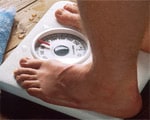Having obese parents substantially raises a child's risk of becoming obese, with mothers weight playing a particularly important role.

Past studies have shown childhood obesity to be more strongly associated with mother's weight than father's weight. To find out the effects of maternal and paternal weight on obesity risk in children, researchers reviewed 4,432 UK families and 7,078 children, aged between 2 and 15 years. The researchers measured the parents' weight and height, and did not have to rely on self-reports. The researchers classified the parents and children as normal-weight, overweight, obese or severely obese based on their body mass index.
It was found that the children who had two obese parents were 12 times more likely to be obese than children with two normal-weight parents. That was with factors such as socioeconomics - gauged by parents' jobs - and ethnicity taken into account. Mothers' weight showed a particularly strong association with children's weight.
In 38 percent of the families, at least one parent was obese, while 8 percent had two obese parents. Only 14 percent of families were headed by two normal-weight parents. Child obesity was uncommon in families with two normal-weight parents, at roughly 2 percent. But in families with two obese parents, 22 percent of children were also obese; when both parents were severely obese, 35 percent of children were obese.
Paternal and maternal weights were each connected to children's risk of being obese. Among children with an obese father, 12 percent were obese themselves, versus 4 percent of those with normal-weight fathers. Of children with an obese mother, 14 percent were obese, compared with 3 percent of kids with a normal-weight mother.
When the researchers did a statistical analysis controlling for the other parent's weight, they found that mothers' weight showed a statistically stronger association with children's weight than did fathers'. The reasons for that finding are not certain. However, mothers may be relatively more important because their weight and diet during pregnancy affect fetal development - and may help set a child's future appetite regulation and weight.
It was concluded that the mother-child association is stronger than the father-child association.
The findings suggest that parents who are obese should be aware of their children's increased risk and try to encourage healthy eating and regular exercise. That includes improving their own lifestyle habits so they can serve as a role model for their kids.
DoctorNDTV is the one stop site for all your health needs providing the most credible health information, health news and tips with expert advice on healthy living, diet plans, informative videos etc. You can get the most relevant and accurate info you need about health problems like diabetes, cancer, pregnancy, HIV and AIDS, weight loss and many other lifestyle diseases. We have a panel of over 350 experts who help us develop content by giving their valuable inputs and bringing to us the latest in the world of healthcare.












